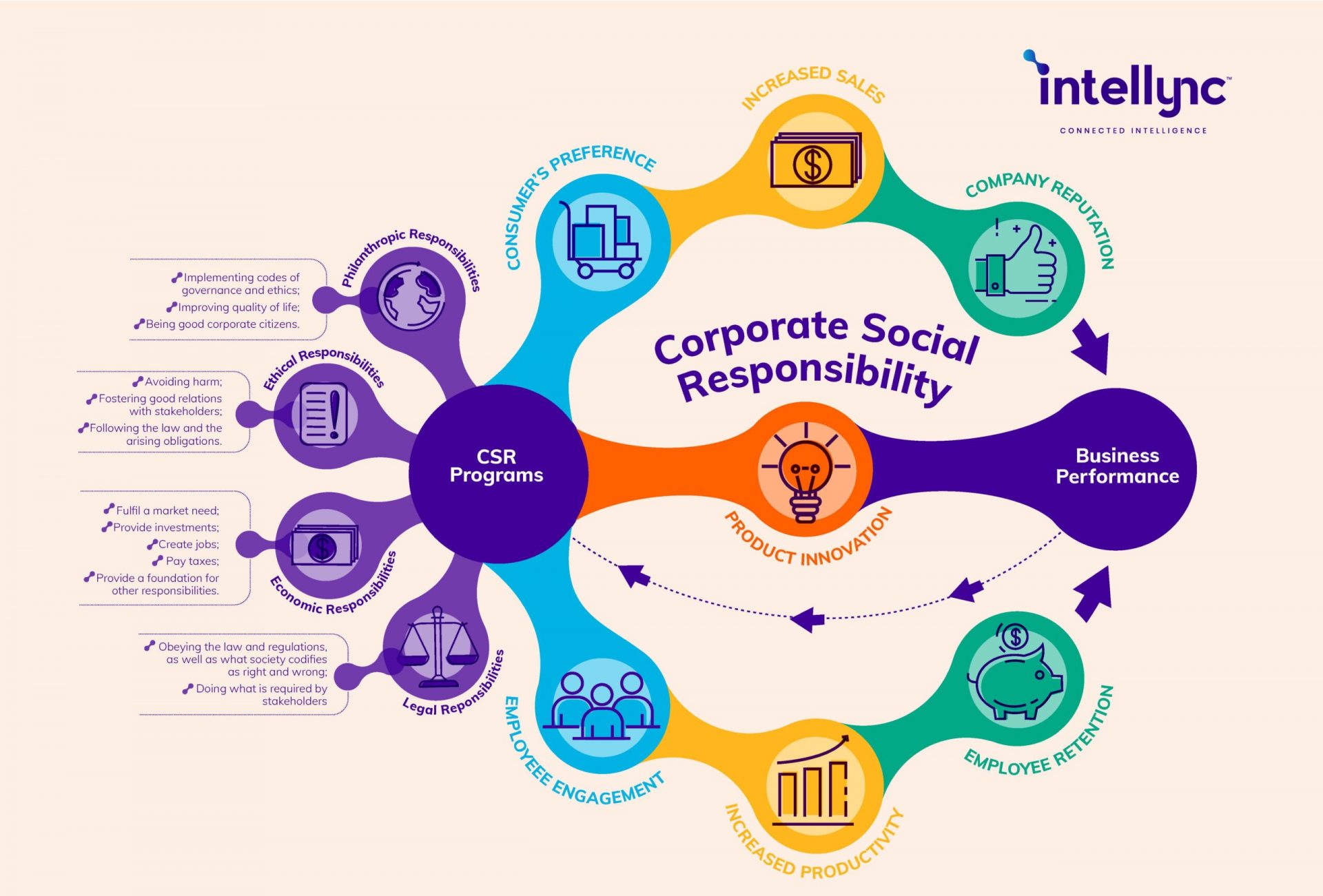Corporate Social Responsibility
February 11, 2021

Corporate Social Responsibility
All businesses have impact on the lives of citizens and on the environment, not only through the products and services they provide but also in terms of working conditions, human rights, environmental health, innovation, education, and training. This means that companies have responsibilities towards their employees, clients, and the society, which they are expected to comply with. Enterprises must also fully understand their negative impacts and develop plans to prevent, manage, and mitigate such impacts. Companies can integrate those plans and act within their supply chains under a concept commonly known as ‘corporate social responsibility’ (CSR).
What is it?
Social responsibility is an enterprise’s commitment to manage its social, environmental and economic impacts in a responsible manner. In 2001, the European Commission defined CSR as “a concept whereby enterprises integrate social and environmental concerns in their business operations and in their interaction with their stakeholders on a voluntary basis”. In a recent update the definition became “the responsibility of enterprises for their impacts on society” [COM/2011/0681] to account for the multidimensional nature of CSR and for internationally recognised principles and guidelines (e.g. the United Nations Guiding Principles on Business and Human Rights, the ISO 26000 Guidance Standard on Social Responsibility). Based on these rules, CSR must cover human rights, gender equality and employee health and well-being, resource use efficiency, life-cycle assessment, and pollution prevention, contending bribery and corruption, community involvement and development, and the integration of disabled persons, among others. Consumer interests, including their privacy, the promotion of social and environmental responsibilities throughout the supply chain, and the disclosure of non-financial information, are also part of CSR.
The enforcement of laws regarding modern slavery, for instance, is increasing both in the number of regulations and on non-compliance sanctions. The mandatory reporting on the assessment of modern slavery risks, the actions taken to avoid it, and the effectiveness of such actions are gaining relevance as more strict criteria regarding enterprises’ structure, operation, and supply chain are added.
Why is it important?
Including CSR procedures in a company business model helps strengthen its reputation and builds vital links with the communities in which it operates. CSR projects also have positive impacts within companies, enabling employees to have access to fresh perspectives and enhancing their skills (opening up space for innovation and new business opportunities), but also improving risk management, cost savings, access to capital, customer relationships, and the sustainability of operations. Also, clients committed to CSR often prefer working with companies that share the same vision and philosophy, creating synergies that have positive impacts and contribute to a more sustainable economy. Moreover, there is a strong moral case for CSR as it comprises a set of values aiming to build a more cohesive and empathic society by supporting individuals and vulnerable groups.
As CSR evolves to include new goals, businesses will be legally required to identify any violations of human and labour rights and pinpoint the responsible sourcing of their products and their supply chains. In the upcoming years, several new regulations are expected to be put into action across the globe. Managers, board members, and chief executive officers will have two main concerns: evaluate CSR programs and ensure they comply with the new laws and publicise that compliance. Because buyers have also become more aware of the ethics behind the products they acquire, enterprises that do not prove their commitment to CSR risk reputational damage and business losses. This means the impacts of an enterprise’s CSR program will be felt more in the ‘court of public opinion’ than in the court of law where regulatory enforcement is undertaken.
How to address it?
The development of CSR programs is a crosscutting issue to all businesses. While enterprises are responsible for CSR implementation, public authorities should promote transparency on social and environmental issues, create market incentives, and ensure the compliance of those programs. As so, enterprises should be able to select the CSR approach that best suits their circumstances as long as they act accordingly with the principles and guidelines supported by public authorities. However, investors, trade unions, consumers, civil society, and the media also play a role in CSR by identifying problems, enhancing market reward, raising awareness on the positive and negative impacts of enterprises and identifying potential improvements in CSR programs. Having a strategic approach to CSR allows enterprises to build long-term employee, consumer, and citizen trust that creates an environment in which enterprises can innovate, increase competitiveness, explore new markets, and ultimately grow. With higher profits come new investments, including those in CSR practices, thereby closing the loop (Figure 1)
The continued public pressure and media scrutiny on enterprises’ CRS actions, particularly on addressing human rights and environmental protection, have increased the enforcement, vigilance, and penalties related to CSR legislation. Although most enterprises, particularly small-to-medium ones, might already promote close relationships with their employees, the local community, and their business partners, the process by which they meet their CSR goals is usually informal and intuitive. In addition, while complying to present laws, businesses should also prepare for the legislation they reasonably expect will be enacted in the future, meaning enterprises need to be flexible in their CRS programs and be prepared to adapt to new regulations. In many cases, this requires a certain level of expertise that may not exist in house and it involves budgeting for both present and potential compliance requirements. Contracting external experts in the form of consulting support can help measure and deliver positive impacts across environmental, social, and governance programmes, minimise risk, and enhance responsible supply chain activities. Because identifying what the next CSR issue might be and being prepared for its costs will certainly mitigate its impact, a structured compliance plan on CSR is highly on demand.
Intellync has the expertise and tools to help your company complying with current and potential CSR goals.